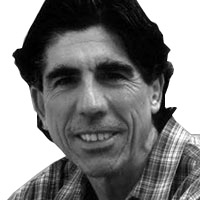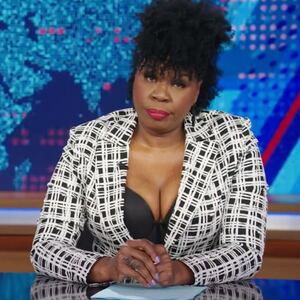In his new book, Straight Shooter: A Memoir of Second Chances and First Takes, Stephen A. Smith describes himself as the “number one sports-media personality in America.” He may just be right if we keep the emphasis on personality. It’s hard to think of a sports journalist more widely known these days.
And widely known is what Smith wants readers to realize he is. His memoir is above all an account of how he has come to be a success story and a millionaire. He talks about his two daughters as his greatest blessing with deep feeling, but we don’t see him interacting with them nearly so much as we see him climbing the career ladder.
Smith appears weekday mornings on the ESPN talk show First Take. He also does commentary for the network on everything from boxing to basketball, and he has a recurring role on the soap opera General Hospital. But Smith’s popularity is not simply a consequence of the many hours he spends before television cameras. It’s a reflection of the way in which he has combined sports analysis and self-promotion to successfully put on television the kinds of water-cooler arguments about sports that go on across America.
The format for First Take is that of a debate show in which the winners are those who put out their views in the strongest terms. As Smith notes, fans of the show do not want to hear mea culpas or backtracking, He does his best to avoid both, but to his credit, he is willing to acknowledge when his comments cross the line. In 2016 Smith generated a huge controversy when he criticized Ayesha Curry, the wife of basketball superstar Steph Curry, for publicly complaining about a referee’s decision that went against her husband. At the time Smith thought his critics were in the wrong, but in Straight Shooter, he acknowledges he came across as guilty of “mansplaining” and condescension.
In the past, great sports journalists were known for being fine writers. Grantland Rice, the legendary New York Herald Tribune sportswriter, is still remembered for his description of the backfield of the 1924 Notre Dame football team. “Outlined against a blue, gray October sky, the Four Horsemen rode again today,” Rice wrote. “In dramatic lore, they were known as Famine, Pestilence, Destruction, and Death. These are only aliases. Their real names are Stuhldreher, Miller, Crowley, and Layden. They formed the crest of the South Bend cyclone before which another fighting Army team was swept over the precipice of the Polo Grounds this afternoon.”
Rice’s influence extended far beyond his generation. Beginning in the post-World War II years, columnists such as Jimmy Cannon, who wrote for the New York Post and New York Herald Tribune, and Red Smith, a Pulitzer Prize winner who wrote for the New York Herald Tribune and The New York Times, followed the trail that Rice had made for sports columnists. Where they differed from Rice was in the emphasis they placed on social commentary.
By 1972 the gold standard in sports journalism had become Roger Kahn’s The Boys of Summer, his tribute to Jackie Robinson and the Brooklyn Dodgers during a time when baseball was struggling to rid itself of its racist past. The Boys of Summer remains a sports classic, but it does not stand alone.
In recent decades a series of books have analyzed the link between sports and social issues and done so by looking at a variety of subjects: rural poverty and high school football in H. G. Bissinger’s 1990 Friday Night Lights, racism and boxing in David Remnick’s 1998 King of the World: Muhammad Ali and the Rise of an American Hero, and the Great Depression, and rowing in Daniel James Brown’s 2014 story of the 1936 Olympics, The Boys in the Boat.
Such serious sports journalism no longer surprises anyone; nor does the fact that newspapers and books have ceased being the primary venue sports fans turn to for information about their favorite athletes and teams. Television rules today’s sports world, especially with the around-the-clock coverage provided by ESPN. What fans want from those who bring them their sports news is not just reportage but opinions and personal stories about the athletes they watch.
It is this world that has paved the way for the popularity of Stephen A. Smith. He is a beneficiary of the inroads made at ESPN in the early 1990s by Keith Olbermann (no admirer of Smith) and Dan Patrick with their “SportsCenter” program and later by Michael Wilbon and Tony Kornheiser with Pardon the Interruption.
“I never wanted to get into sports journalism just for the purpose of writing sports,” Smith insists in Straight Shooter. His early life suggests why. The son of Caribbean immigrants, Smith was a poor kid from Hollis, Queens, who suffered from undiagnosed dyslexia. He might easily have gotten lost in New York City’s vast public school system. His mother came to his rescue, building up his confidence and helping him navigate an indifferent education system as well as a neglectful father.
Smith initially went to the Fashion Institute of New York because it was the only school to offer him financial aid. But he did not really get started on his education until Winston-Salem State University in North Carolina, an historically Black college, offered him a basketball scholarship. With the encouragement of his coach, Clarence Edward “Big House” Gaines, Smith was able to graduate from Winston-Salem and begin his journalism career.
Smith’s memoir makes it clear that he will never forget his early struggles. His life story explains why so many of the Black athletes past and present whom he admires are defined as much by their commitment to racial justice as their athletic skills.
The success Smith has achieved in sports journalism by working his way up from being a writer at the New York Daily News and The Philadelphia Inquirer is not success he assumes will last without constant cultivation on his part. “You’ve got to have a team. You can’t do it alone,” he emphasizes in his book. He even lists the various agents who have helped him and the executives at ESPN on whom he has relied.
Smith has been persistent on “First Take” in pointing up how Black athletes are turned down for head-coaching positions on the grounds that they lack prior coaching experience while white athletes frequently get head-coaching jobs with little or no prior coaching experience. But surprisingly in Straight Shooter Smith does not grapple—certainly not in the depth he is capable of—with how many sports need to be taken to task for the way they exploit those on the playing field or behind the scenes.
Football is currently dealing with the degenerative neurological disease chronic traumatic encephalopathy (CTE) that comes about as a result of the many diagnosed and undiagnosed concussions players get. At the college and professional levels, there is an effort under way to make the game safer. But what football coaches and most sports journalists are reluctant to admit is that the game as presently constituted may be inherently unsafe—no matter what precautions are taken.
At the start of this year, a nationally televised professional football game between the Buffalo Bills and the Cincinnati Bengals was postponed after Damar Hamlin, a Buffalo player, suffered cardiac arrest on the field. But if there is any motto that currently governs big-time sports, that motto is the show must go on.
Tua Tagovailoa, the gifted young Miami Dolphins quarterback, has been concussed three times this football season, and anyone watching the 2022 World Cup games in soccer on American television could do so without having to cope with disturbing stories about the exploitation of the workers imported by Qatar to build its sports stadiums and the pressure put on players not to wear One Love armbands protesting Qatar’s anti-LBGTQ policies.
The Tagovailoa story and the World Cup story are too recent to be included in Straight Shooter. But there was plenty of room in Straight Shooter for Smith to discuss in full the risks of football or when, if ever, the United States should refuse to engage in sports competition in countries with a blatant record of human-rights abuses. Perhaps these are subjects he will address in a future Stephen A. Smith book as he moves beyond his current comfort zone.
Nicolaus Mills is professor of American literature at Sarah Lawrence College and the author of “Every Army Man Is with You: The Cadets Who Won the 1964 Army-Navy Game, Fought in Vietnam, and Came Home Forever Changed”.







